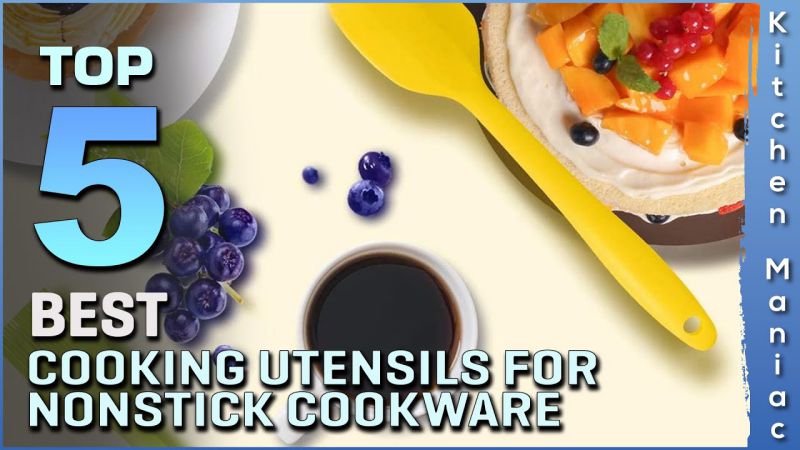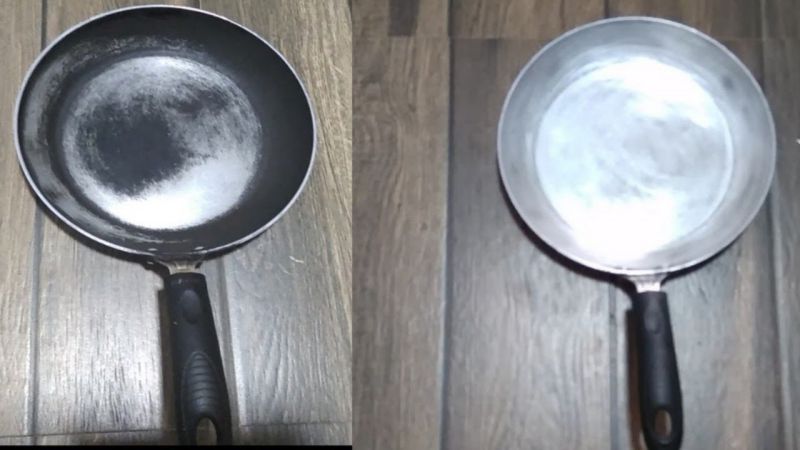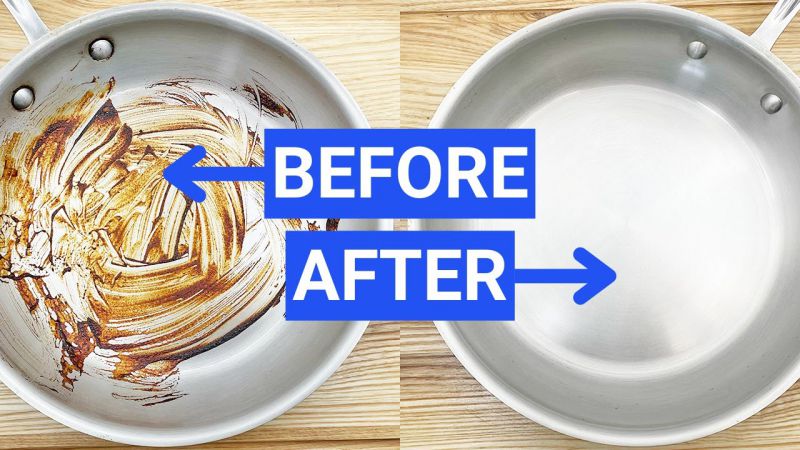Using the wrong utensils on nonstick pans can cause significant damage and reduce their longevity. Understanding what utensils to use on nonstick pans is crucial to ensure that they remain in top condition for years to come.
Most nonstick cookware is coated with a layer of Teflon, which is a chemical lining that prevents food from sticking. Using utensils that are not compatible with this coating can scratch the Teflon layer. Such as sharp metal spatulas or tongs, etc.
Table of Contents
What Are The Best Utensils To Use For NonStick Pans?
To avoid damaging your nonstick pans, it’s best to choose utensils made of materials that are gentle on the surface. The best utensils to use for non-stick pans are as follows:
Wooden Utensils
Wooden utensils have been used for centuries due to the unique properties that make them a popular choice for a variety of kitchen and household tools.
Wood’s rigidity and hardness allow it to break up large chunks of meat and scrape the bottom of pans, while its malleability ensures it won’t scratch or gouge surfaces.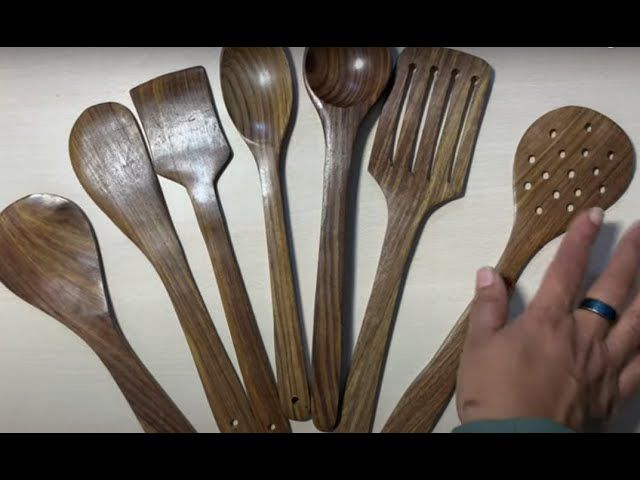
As a naturally occurring material, wood can be found almost anywhere. You may already have a go-to Wooden Spoon in your kitchen collection.
Despite being a versatile workhorse of the kitchen, wooden utensils require extra attention and maintenance compared to other materials.
Despite the additional maintenance, many home cooks consider a Wooden Spoon an essential kitchen tool due to its classic appeal and versatility.
If you prefer a lower maintenance option, other materials are available. Nevertheless, there’s no denying that a well-made wooden utensil adds a unique charm and authenticity to any kitchen.
Nylon Utensils
Nylon utensils have been a kitchen essential for many households for years, thanks to their unique blend of durability, flexibility, and affordability. These utensils are quite rigid, yet they have just the right amount of flexibility to handle a range of cooking tasks with ease.
One of the major benefits of nylon utensils is that they can be used with non-stick cookware without causing any damage. However, it’s worth noting that they may leave some scuffs and superficial scratches on the surface of the cookware, which can be unsightly.
Despite this, these minor imperfections won’t affect the cookware’s performance in any way. It’s important to keep in mind that nylon utensils have a relatively low heat tolerance and can melt if they are exposed to high temperatures for an extended period.
Over time, they can also become brittle and crack, making them less than ideal for long-term use. However, considering their affordability, replacing worn-out nylon utensils won’t break the bank.
Overall, nylon utensils are a great choice for anyone looking for durable, flexible, and affordable kitchen tools.
Silicone Utensils
Silicone kitchen tools are a fantastic choice for those seeking durable, low-maintenance utensils that can withstand high temperatures. These versatile tools are perfect for use in non-stick cookware, and their pliable nature allows them to mold to the shape of any pan, ensuring you get every last drop of your culinary creations.
Most of the silicon utensils are heat-safe up to temperatures well above 500F. Similarly, some utensils may not be labeled and could potentially melt onto your pan when exposed to high heat.
Additionally, many silicone utensils consist of two pieces. Hence, the adhesive used to attach the head may weaken over time, causing the head to become loose.
When shopping for silicone kitchen tools, it’s crucial to select heat-safe utensils that can withstand high temperatures and are made of a single piece.
Choosing silicone tools with a stainless steel core can provide better durability and rigidity, ensuring that your kitchen tools will last for years to come.
Silicone kitchen tools offer a range of benefits, including easy cleaning, versatility, and long-lasting durability. By selecting the right silicone utensils, you can upgrade your cooking experience. Plus, you will enjoy the benefits of quality kitchen tools for years to come.
Related Posts:
- Dispose Off / Throw Away Non Stick Pans / Cookware?
- How To Fix Scratched Non Stick Pan – Step By Step
- Best Non Stick Pan For Electric Cooktop
What Utensils You Should Avoid To Use For NonStick Pans?
It’s important to note that metal utensils, especially those with sharp edges, should be avoided when using nonstick pans. Materials that can scratch or damage the nonstick surface, are as follows:
Stainless Steel
Non-stick pans have become a go-to kitchen tool for many people because of their ease of use and quick cleanup. With their non-stick surfaces, they make cooking and frying food a breeze, requiring minimal oil for the best results.
However, some users may unknowingly be damaging their non-stick pans by using the wrong utensils. Specifically, stainless steel utensils can cause irreversible damage to non-stick pans.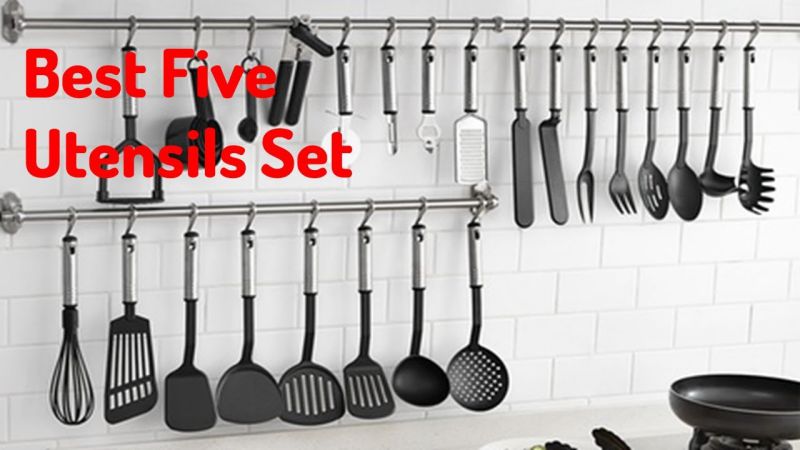
While stainless steel utensils are known for their durability and ability to withstand high temperatures, they can cause harm when used on non-stick pans.
The hard edges of stainless steel utensils can easily scratch and damage the non-stick coating, creating abrasions that can lead to food sticking to the pan. Even if the damage is not visible to the naked eye, it can still weaken the non-stick coating, making it less effective over time.
When stainless steel utensils are used on non-stick pans, the hard edges of the utensils can scrape the coating, weakening it and causing it to peel off during cooking. When this happens, the non-stick coating is compromised, and the pan becomes harder to clean.
Sharp Edge Utensils
When it comes to cooking with non-stick pans, it’s important to be mindful of the utensils you use. Sharp-edge utensils such as metal spatulas, knives, or tongs can easily scratch the non-stick coating, leading to several issues.
Firstly, scratches can cause the coating to peel off, exposing the metal surface of the pan. Additionally, small chips or flakes of the non-stick coating can mix with food and be ingested, which can be harmful to health.
Furthermore, the use of sharp utensils can create hot spots on the pan, leading to uneven cooking and reducing the non-stick properties of the pan. Repeated use of sharp utensils can further damage the non-stick coating, making it less effective in preventing food from sticking.
To avoid such issues, it is advisable to use utensils made of silicone, wood, or plastic, which are gentler on the non-stick coating.
Copper
Copper utensils are renowned for their exceptional heat conductivity and resilience, which make them a popular choice for kitchenware. However, using copper utensils carelessly can have detrimental effects on non-stick pans.
The reason is, that copper is a reactive metal that can react with the non-stick coating, leading to its gradual deterioration and loss of non-stick properties. In addition, harmful chemicals can also be released into your food, posing a significant health risk.
It’s essential to note that acidic foods such as tomato sauce can expedite the damage caused by copper utensils to non-stick pans. The acid in the food can corrode the copper, leading to the leaching of copper into the non-stick coating, thereby increasing the rate of breakdown and rendering it ineffective.
Therefore, it’s vital to use copper utensils with care and caution, especially around non-stick pans. Avoid using copper utensils when cooking acidic foods, and opt for alternative kitchenware made from materials that do not react with the non-stick coating.
Furthermore, it’s advisable to hand-wash copper utensils and avoid using abrasive cleaning materials such as steel wool, which can damage the copper’s surface and hasten the corrosion process.
With proper care and use, copper utensils can provide a long-lasting and safe cooking experience, preserving the non-stick properties of your pans and protecting your health.
Conclusion
Selecting the right utensils for your non-stick pans can be challenging, but it’s essential to avoid any damage to your cookware. Wooden spoons, silicone spatulas, and nylon flippers are some of the best choices. Each of these utensils has unique characteristics that make them suitable for different cooking needs.
Wooden spoons offer a natural feel, silicone spatulas are heat-resistant. Similarly, nylon flippers are lightweight and easy to use. So, go ahead and add these versatile utensils to your kitchen arsenal and enjoy cooking without any worry about damaging your non-stick pans.

